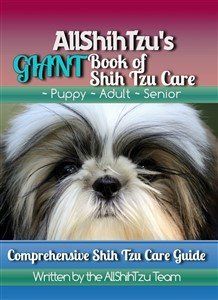How to Resolve Shih Tzu Bad Breath


Overview
Please note: AllShihTzu is reader-supported. Some links below are affiliate links, meaning we may earn a small commission on products through these, at no extra cost to you.
Top Causes of Chronic Bad Breath with Shih Tzu Dogs
- Dog Food: Often referred to as 'dog breath,' this is usually caused by stale dog food. Dry kibble, in particular, produces particle dust which, when mixed with saliva, can form a paste-like substance in a dog's mouth, leading to unpleasant odors.
- Dietary Habits: Consuming certain foods, garbage, or feces (a behavior known as coprophagia) can result in foul breath.
- Fish Oil: While very beneficial for skin and coat health, excessive fish oil supplements can cause fishy-smelling breath in Shih Tzu dogs. In severe cases, this odor may emanate from the entire body.
- Plaque and Dental Issues: Plaque production is continuous and it can harden into tartar within three days. This leads to bad breath, tooth decay, gum infection (gingivitis), and potentially serious infections like sepsis if untreated.
- Foreign Bodies Stuck in Teeth: Foreign objects like food remnants, splinters, or small items lodged in the teeth can cause excessive salivation and possibly bleeding, contributing to bad breath.
- Lack of Water: Inadequate water intake can lead to drier mouth conditions, reducing saliva flow which normally helps cleanse the mouth.
- Teething in Puppies: During teething, puppies may experience bleeding gums. This, combined with saliva, can result in a distinct, sour-smelling breath.
- Respiratory System Infections: Infections in the nose, sinuses, or throat can contribute to bad breath due to the presence of additional bacteria.
- Gastrointestinal Issues: Problems within the gastrointestinal tract, including tumors, obstructions, or diseases, can lead to bad breath.
- Oral Tumors: Tumors or growths in the mouth can harbor bacteria and food particles leading to bad breath.
- Other Health Issues: Underlying health problems such as diabetes, kidney disease, or liver problems can cause distinct types of bad breath. For instance, a sweet or fruity odor may indicate diabetes, whereas breath that smells like urine can be a sign of kidney disease.
How to Fix Your Shih Tzu's Bad Breath
#1 Rule Out Possible Health Issues
The first and most crucial step in addressing bad breath with a Shih Tzu is to have the veterinarian rule out any underlying health issues. Several health problems can contribute to bad breath, including diabetes, which can give the breath a sweet or fruity odor; kidney disease, often indicated by a urine-like smell; liver problems; respiratory system infections, which introduce additional bacteria; gastrointestinal issues like obstructions or diseases; and oral tumors.
It's essential to identify and treat these conditions early, as they not only cause halitosis but can also lead to more serious health complications.
#2 Address Any Dietary Causes
The next step is to address and fix any dietary causes:
- For Food Stuck in Teeth: Stale, powdery dry dog food mixed with saliva can stick to teeth, leading to bad breath. Brush teeth regularly, offer fresh water, and store food in airtight containers to prevent it from going stale.
- For Fish Oil Consumption: If a dog's diet is high in fish oil, it may lead to fishy-smelling breath. Reducing the fish oil intake can help alleviate this problem, but it will be a balancing act.
- For Eating Feces (Coprophagia): Keep environments clean and pursue behavioral training for coprophagia.
- For Insufficient Water Intake: Encourage increased water consumption. A canine water fountain can lead to more frequent drinking, aiding in mouth cleansing and breath freshening.
#3 Address a Possible Foreign Object in the Mouth
Bad breath in dogs can sometimes be caused by foreign objects, like food scraps or splinters, stuck between their teeth or even piercing the inner check, leading to excess saliva and possible bleeding. To rule this out, inspect your Shih Tzu's mouth, using a flashlight and, if possible, gently remove any visible objects using dental floss or a plaque scraper. For difficult cases or uncooperative dogs, it's best to seek assistance from a veterinarian.
#4 Assist a Teething Puppy in Managing Bad Breath
As teeth break through the gums, minor bleeding can occur, mixing with saliva to produce an unpleasant, sour odor. Encourage your puppy to chew on appropriate toys, as this stimulates saliva production, which helps cleanse away blood. Additionally, implementing good dental hygiene practices early on is beneficial for overall oral health.
#5 Start an At-home Routine of Good Oral Hygiene
With the above ruled out, it's time to get your Shih Tzu's mouth clean and their breath smelling nice and fresh. The 5 steps below are easy and the key is to be consistent.

#1 Daily Brushing
For beginners, a fingertip brush can be more manageable, while a small-sized canine toothbrush is effective for reaching crevices. Use a high-quality, non-foaming, fluoride-free canine toothpaste, preferably made in the USA and flavored to appeal to dogs.
The Arm & Hammer for Pets Complete Dental Kit includes peanut butter-flavored toothpaste, a canine toothbrush and a finger-brush, and is an excellent choice. Note that this is sized for puppies (of larger breeds) and small breeds like the Shih Tzu. Aim for a thorough 3-minute brushing session, ideally twice a day.
#2 Dental Wipes
If you're tried brushing your Shih Tzu's teeth to fix their bad breath, but they just won't tolerate it, another option is canine dental tooth wipes, like ARCA PET Dental Finger Wipes for Dogs. These are different than the 'fingertip brush' mentioned above. These are disposable, pre-soaked wipes that fit over your finger. The ARCA wipes are made with coconut oil, green tea, and grapefruit seed, which are all natural cleansers.
#3 Dental Chews
Incorporate a daily dental chew, like Greenies Teenies Dental Dog Treats, to help remove stubborn plaque. Ensure the chews are approved by the Veterinary Oral Health Council. As these are hard chews, supervise your Shih Tzu when they are given these.
#4 Mouth Spray
While brushing or wiping a dog's teeth is the best way to remove plaque, old food and other odor-causing elements, if your Shih Tzu does not tolerate those methods, this can be an option. There are many types of sprays marketed, with varying levels of effectiveness. Some work to fix underlying dental issues and some simply cover bad breath. A spray like the Oxyfresh Advanced Pet Dental Spray is designed to reduce plaque buildup, keep gums healthy and freshen a dog's breath.
#5 Water Additive
This alone cannot remove all plaque and all the elements that can cause bad breath; a brush or wipes is the best choice for that. But a water additive can be a good supplemental treatment. This is often flavorless and is meant to be added to a dog's daily water. It is designed to work by helping to kill bacteria in the mouth.
One that we recommend, Dental Fresh Advanced Additive, has zero alcohol, sugar, surfactants or flavor, so most Shih Tzu dogs will never know it's in their water bowl.
If a Shih Tzu Only Has Bad Breathing When Burping
Some dogs, while not suffering from bad breath, may experience foul-smelling burps. This occurs when the body expels excess stomach air, often carrying the odor of partially digested food. Rapid eating or drinking is a common cause of this extra stomach air. A solution is a slow-feeder dog bowl which encourages a dog to eat slow. This is one of several recommended dog bowls for the Shih Tzu breed.
However, if a Shih Tzu shows signs of stomach distress, such as vomiting, dry heaving, appetite changes, loose stools, or constipation, it's crucial to consult a veterinarian. These symptoms may indicate more serious issues beyond mere bad breath.
Are You an AllShihTzu Member?
More Articles:
Shih Tzu Physical Comfort: Addressing 5 Critical Concerns - How to address the top 5 concerns of: Sensitive skin, tummy troubles, cold intolerance, breathing discomfort, and mobility issues in Shih Tzu dogs. Help your Shih Tzu start feeling better today.
Wonderful Coat Fragrances for a Shih Tzu - In certain top-quality coat sprays, you'll find surprisingly pleasant scents that not only protect a Shih Tzu's skin and coat from irritants, allergens, UV rays, and more, but also help them smell delightful.
Shih Tzu Summer Care - When temperatures start to rise and summer's on the way, it's time to prepare your Shih Tzu. See our top tips for keeping your little guy or gal cool, comfortable and happy all summer long.

